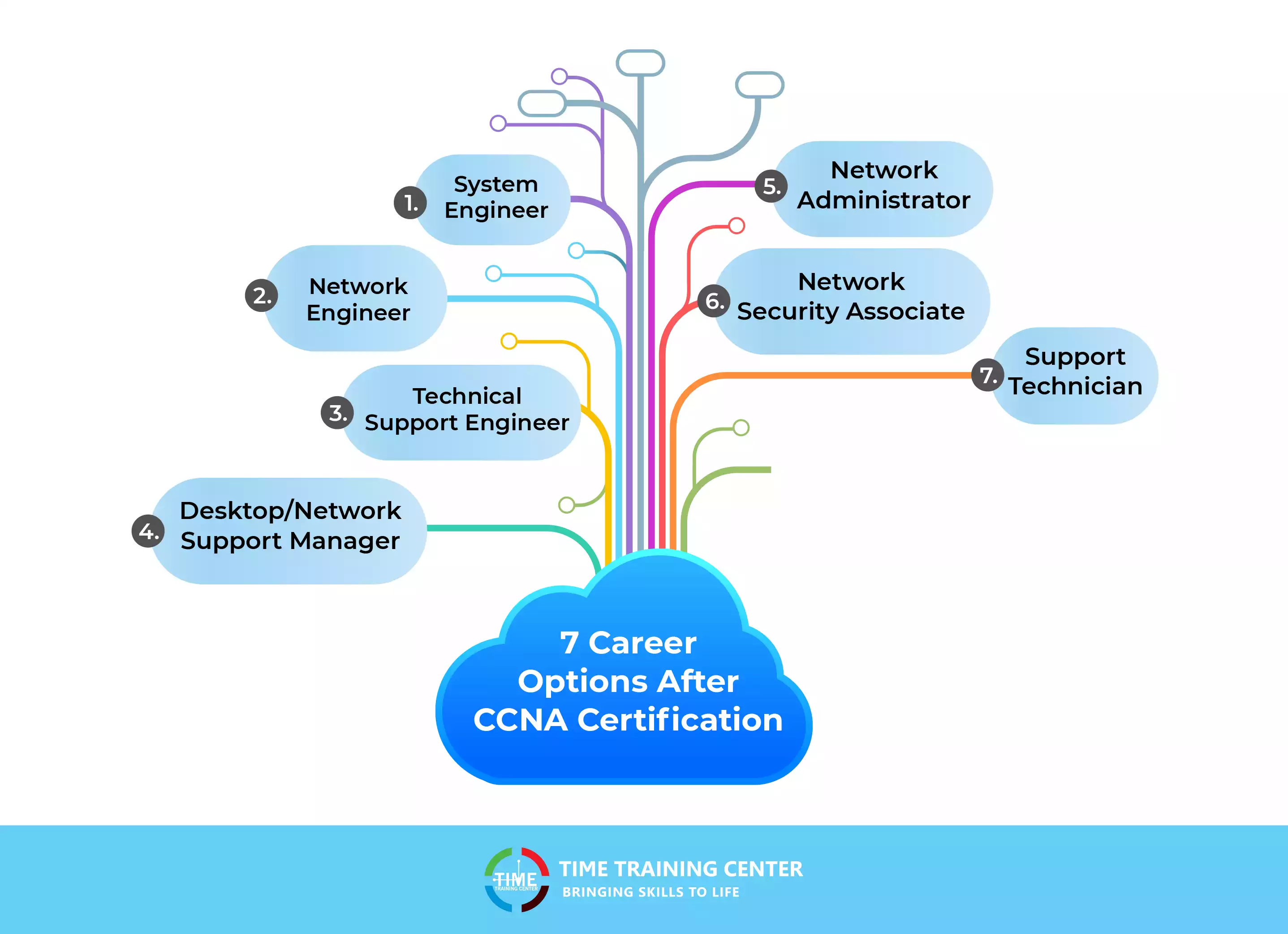The associate-level certification known as "CCNA" (Cisco Certified Network Associate) assesses a candidate's competence to design, oversee, and troubleshoot a small network. The CCNA program offers numerous tracks, including CCNA Routing and Switching, CCNA Security, CCNA Data Center, CCNA Wireless, and many others. In the networking world the most trusted and highly valid certificate is the CCNA, so to show that you are an expert and gain the trust of hiring managers, you need to have this certificate.
Check Out: CCNA Exam Preparation Tips
7 Career Options After CCNA Certification
A CCNA course can help you become a certified CCNA professional and also allow you to work for an organization and meet your career goals. Let's discuss the 7 job profiles you can go with after CCNA certification.
-
System Engineer
-
Network Engineer
-
Technical Support Engineer
-
Desktop/Network Support Manager
-
Network Administrator
-
Network Security Associate
-
Support Technician
-
System Engineer
The development and management of various gadgets (systems) within an organization is the primary duty of a system engineer. That could involve various PC hardware, routers, switches, or other employed devices. You must become well-versed in the many hardware features of routers and switches in order to accomplish this.
Responsibilities:
-
Organize and maintain all established equipment and systems.
-
Installing, configuring, testing, and maintaining software for applications, operating systems, and network management systems
-
Make greater concentration to assure the highest levels of infrastructure and system availability.
-
Work with developers to apply the fixes you find by testing and monitoring the performance of your application for potential bottlenecks.
-
Keep your redundancy, backup, and security measures in place.
-
2nd and 3rd level support should be provided.
-
To solve issues, communicate with suppliers and other IT staff.
-
Network Engineer
In the realm of networking, they could be employed by an organization's IT support staff. Their primary duties include network design, implementation, maintenance, and support. This position heavily relies on having Cisco networking capabilities.
Responsibilities:
-
Installing and configuring various network services and devices
-
Maintain your network and upgrade your system, installing service packs, patches, and security configurations.
-
Maintain system availability and dependability while keeping an eye on performance.
-
Tracking trends and capacity planning for system resources.
-
To fix problems, offer support and troubleshooting at Level 2 or 3.
-
To assure awareness, approval, and the success of changes made to the network infrastructure, work within the defined configuration and change management procedures.
-
Technical Support Engineer
They are in charge of putting in place and setting up various network services and devices (e.g, routers, switches, firewalls, Deploying service packs, fixes, and security configurations that will allow you to maintain your connection and upgrade your system.
While monitoring performance, maintain system availability and dependability. Monitoring patterns and planning system resource capacity. Provide Level 2 or 3 help and troubleshooting to resolve issues. Work within outlined setup and implement new protocols to ensure knowledge, acceptance, as well as the effectiveness of modifications made to the network infrastructure.
Responsibilities:
-
To give software support and general configuration.
-
Must provide internet connectivity and setup in general.
-
To carry out limited administrative work.
-
Support with creating software and project testing.
-
Dealing with consumers in a technically proficient manner.
-
To give email and phone support to external organizations.
-
Desktop/Network Support Manager
The L1 and L2 maintenance teams would be a more accurate description. You won't have immediate access to routers and switches, but you will need to help the engineers who do.
Responsibilities:
-
Deal with tickets that have been sent by phone, email, or web.
-
System notifications and alerts are tracked and managed, and service tickets are used to address any issues that arise.
-
Support for computer problems with operating systems and key business applications.
-
Routers, firewalls, and security are examples of basic technical assistance at the network level.
-
VPN deployment and assistance with remote access solutions.
-
print the support Networking difficulties and printing issues.
-
Updating and reviewing system documentation
-
For the problems that were noticed or reported, work with the vendors
-
Network Administrator
The network administrator's job is to make sure the computer networks run smoothly. All system infrastructure, software, and networking devices must be planned, developed, installed, configured, supported, and optimized. In addition, the individual will quickly and accurately diagnose and fix computer issues involving end users' hardware and software and, if necessary, offer end-user training.
Responsibilities:
-
Establish and maintain intranet, internet, WAN, and LAN systems.
-
Setup and upkeep of system software and hardware.
-
Make sure the internet connection is up to pace with technological factors throughout a company's LAN/WAN architecture.
-
Create and deploy networks, and assign addresses to networks.
-
Allocate networking protocols and the setting of the routing table.
-
Assign the settings for directory services' identity and access management.
-
Network-Related Problems Troubleshooting.
-
Network Security Associate
The ideal choice for those who want to pursue a career in cybersecurity. A security associate's duties include assessing fundamental security vulnerabilities to find cyber threats. Please be aware that if you wish to work in security, you must complete both the CCNA Routing & Switching and the CCNA Security exams.
Responsibilities:
-
Checking an organization's security measures,
-
To protect the network, distinct processes need to have policies created for them.
-
The identification, assessment, and migration of security risks, threats, and weaknesses
-
management of the system firewall, IDS, and IPS,
-
keeping track of security audits and various log messages,
-
Investigate security lapses or illegal access, elevate the situation, and take appropriate action.
Check Out: What is Digital Security?
The main duty of the support technician is to provide computers with technical help, either locally or remotely. Personal computers, accessories, and software application debugging are among the tasks. On occasion, they are expected to concentrate on connectivity to networks and the internet. They ought to have the ability to collaborate with both technical and non-technical workers.
Responsibilities:
-
Create, install, and upgrade hardware and software
-
Fixing computers and making sure the servers are operating properly
-
Using diagnostic tools and keeping computer networks up
-
collecting information to evaluate the client's requirements
-
The review of the network needs
-
Setup and maintenance of telecommunications
-
Administration of systems
-
Changing faulty settings
-
Ability to change hardware, get rid of malware or spyware, or rebuild the operating system
Conclusion
After earning a CCNA certification, one can apply for a variety of positions in the networking industry. You can apply for any of top job profiles, after having your certification in CCNA like professional IT security courses. It is advised that you take the CCNA certification exam if you work in or want to work in the networking industry because it will increase your job options there as it is the most trusted network certification in the cyber world.
You might also be interested in: Career Benefits of Ethical Hacking
 +971 2 6713828
+971 2 6713828




